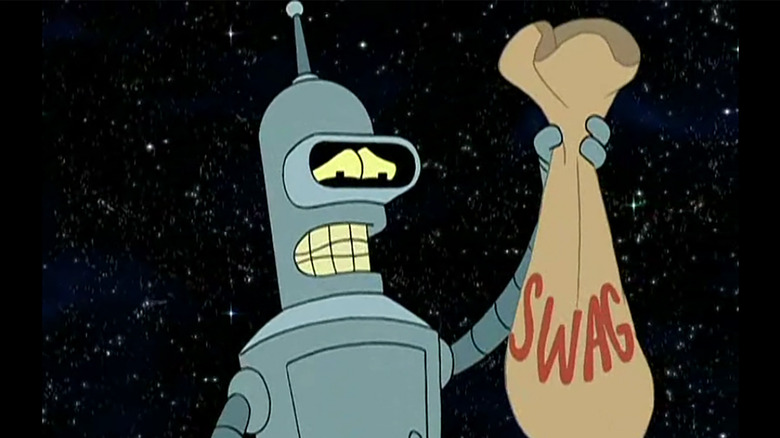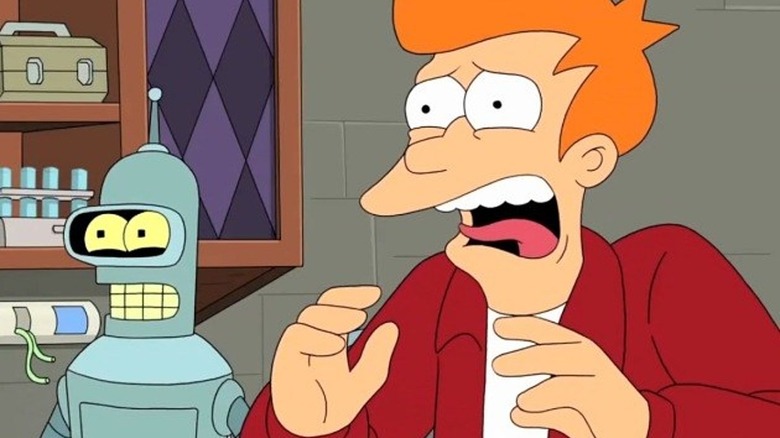Star Trek And Star Wars Showed Matt Groening What He Didn't Want Futurama To Do
"Star Wars" is set in the distant past and tells stories of war, heroism, cryptic mystics, evil wizards, and the triumph of heroes. To creator George Lucas, the future is bleak, but the past is ideal. There is something to look back on. "Star Trek" is set in the distant future and tells stories of peace, benevolent technologies, anti-colonialism, and the power of diplomacy. To creator Gene Roddenberry, the present is bleak, but the future will be ideal. There is something to look forward to.
These two popular sci-fi franchises have long remained vital pivot points in popular culture, and may indicate a bifurcated view of history widely held in the United States. Some feel that glorified battles of the past, and our defeat of our enemies, are what define us. Others look to the future to find glory, imagining a day when Earth settles into a groove of enlightenment and become devoted to equality.
And then there's "Fututama," which is set in the future and tells stories of petty idiots, alcoholic robots, mad scientists, and amazing technologies used to encourage laziness. To creator Matt Groening, the future is more or less the same as the present. There is a lot of casual despair, a lot of political corruption (Richard Nixon's living severed head is president of Earth), every possible dead-end job exists, and everyone is still kind of a dolt.
Back in 1999, when "Futurama" first debuted, an interview with Groening was published on the Got Futurama website. In it, Groening laid out exactly how he used "Star Trek" and "Star Wars" as a counterpoint for what he wanted to do with "Futurama."
It's not a knock
Groening wanted to make explicit that he was not necessarily satirizing "Star Trek" nor "Star Wars" with "Futurama." Indeed, his show is its own entity that is not predicated on knowledge of either. But Groening did want to specifically eschew both of the well-known franchises base philosophies. "Futurama," he said, wasn't going to be set in a world at war, nor a world that has passed through some vague portal of social enlightenment. Groening points out that both "Trek" and "Wars" are incredibly militant shows about either war or a chain of command. This was anathema to what the "Life in Hell" author wanted to do. He said:
"I love 'Star Wars' and 'Star Trek' and all the variations on them. However, I wanted to do a TV show in which the problems of the universe are not solved by militarism guided by New Age spirituality. I just thought — let's try something different, you know. It's not a knock. It's not a knock on the optimism of those shows. I just have a slightly — I'm going to get fired — a slightly more subversive take, I think."
Whether or not "Futurama" is itself optimistic can be debated. One might argue that it's a net positive that the world, full of idiots as it may be, will persist into the future regardless. We will build robot companions, and they will immediately develop drinking problems. That's a positive (robots!), and a negative (they drink?), and a dark existential quandary (our own creations hate us?). Groening appears to be the kind of person who looks at a bleak outcome, and kind of chuckles at its weary, amusing inevitability.
Doomsville
One might very well say "Futurama" was subversive. Anyone who has read Groening's "Life in Hell" knows that the author's outlook can be a little bleak. "The Simpsons" is now seen as an institution, but it once functioned as an antidote to the cleanliness of conservative, 30-year-old sitcom tropes. "Futurama" also started its life as a bleak, darker commentary on the brightness of "Star Trek"-like science fiction. One of the proposed titles for "Futurama" was "Doomsville," certainly a more apocalyptic title.
Although one doesn't see them so much in later seasons, earlier episodes of "Futurama" featured suicide booths on every corner. These were coin-operated euthanasia pods that were used regularly. "Futurama," it seems, was initially meant to be a dystopian narrative about how society is crumbling. Somewhere during production, however, Groening and his co-creator David X. Cohen decided to lighten things up. "Futurama" now takes place in a perfectly functional society, albeit one that often feels like it's dangling by a thread.
But then, when things looks bleak in the present, one can argue that we, despite ourselves, foolishly persist.
The bleak-ish "Futurama" is certainly embraced by many. The show was canceled, but then resurrected numerous times in its life. Its most recent iteration will be coming to Hulu in 2023. Just like humanity, "Futurama" staggers hopefully forward.


